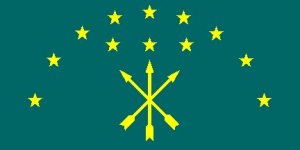
ADYGEYA
Adygey
Just like other Circassian peoples like the Kabards and the Cherkess, the Adygey are descendants of the indigenous population of the North-Western parts of the Caucasus.
From the beginning of the 16th c., the Adygey territory came under the influence of the Crimean Khans. This was also how the Adygey came in contact with Islam, and by the early 19th c. they had converted.
In the period until 1800, the Adygey were weakened by internal rivalry, giving the Russians the opportiity to intervene in the region. In the 1820s, troops of the Russian tsar started to act more systematically to conquer the territory. The Adygey were united by the new struggle for independence, and their unity was further strengthened by islamism, which became an ideological basis of their fight for freedom. In the 1840s, the Adygey had military success and controlled the coastline on the Black Sea. It was not until 1864 that the Russians took control over the last of the Adygey villages. Adygey were given the choice of either leaving the mountains and resettle on the plains, or flee to Turkey. Many Adygey left for the countries of the Middle East.
During the Civil war, many Adygey fought with the Mensheviks against the Red Army, and from both sides there were many incidents of mass executions, burning of villages etc. In 1922, Adygeya was established as an autonomous region in the Krasnodar district. It shifted several times between various administrative units until it again was placed under Krasnodar in 1937. In 1991, the regions status was upgraded to Republic.
According to the 1989 census, the region had the highest percentage of ethnic Russians (68%) of all the North Caucasian national territories. The titular nationality constituted only 22.1% of the population. The Kuban Cossacks, who for more than 200 years lived in close proximity to the Adygey, have had peaceful relations with the Adygey population. The Adygey share with the Kabards and Cherkess a mutually understandable Caucasian language, and all three groups often refer to themselves as "Adygey".
Source: Norwegian Institute of International Affairs [NUPI] - Centre for Russian Studies
Back to Caucasus main page
|

